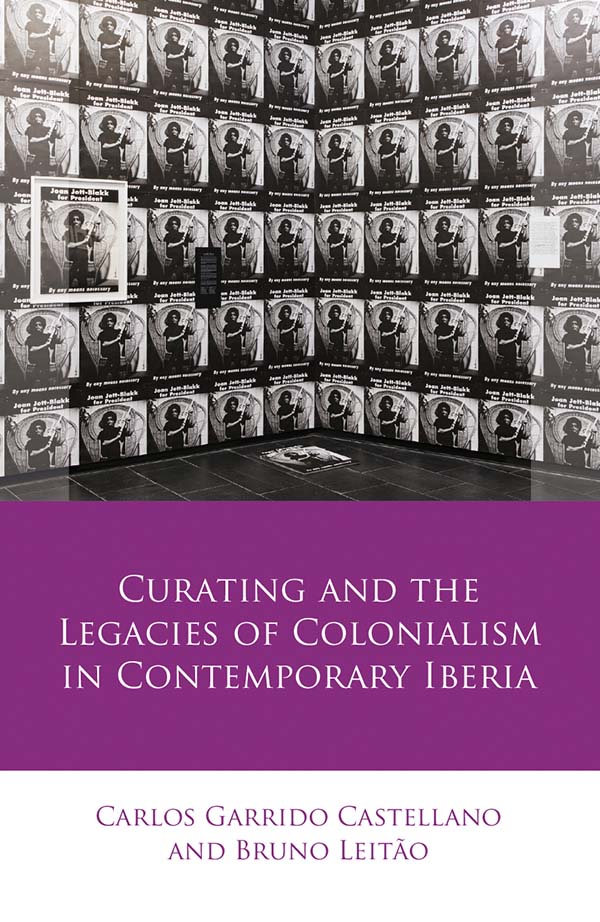Curating and the Legacies of Colonialism in Contemporary Iberia
Editor(s) Carlos Garrido Castellano,Bruno Leitão
Language: English
Genre(s): Art and Music
Series: Iberian and Latin American Studies
- June 2022 · 304 pages ·216x138mm
- · Hardback - 9781786838735
- · eBook - pdf - 9781786838742
- · eBook - epub - 9781786838759
Combining postcolonial studies, curating and contemporary art, this book surveys the role played by artistic curatorship and contemporary art museums in the shaping of identities and cultural planning in contemporary Iberia. The book’s main hypothesis is that contemporary art has been pivotal in the construction of contemporary Iberia, a process marked by the attention paid (in heterogeneous, not always satisfactory ways) to the entanglement of the legacies of colonialism and the present-day status of Iberian territories as cosmopolitan societies now integrated in the European Union. It is argued that, at least from the 1990s, curating emerged as a key activity for Iberian societies to display and configure an image of themselves as modern and fully integrated in the European cultural landscape. Such an image, however, had to cope with the legacies of colonialism and the profound socioeconomic transformations of these societies. This book is concerned with bringing together, while redefining and expanding, Iberian and curatorial studies.
Acknowledgements
List of Illustrations
List of Contributors
Introduction: Fictions of Cosmopolitanism, Spectacles of Alterity. Curating and the (Un)Making of Coloniality in Contemporary Iberia. - Carlos Garrido Castellano and Bruno Leitão
Part I: Displaying Coloniality
Chapter 1: Remapping Disciplines, Displaying Possibilities. A Curatorial Studies-Based Approach to Iberian Studies. - Carlos Garrido Castellano
Chapter 2: Curatorial displacements in Spain before and after the 2000s: Coloniality tricks, exhibition eclipses and critical agencies. - Olga Fernández López
Chapter 3: The Exhibition as Representative Strategy for Cultural Diversity: Barcelona, 1992-2011. - Pep Dardanyà
Chapter 4: Displaying Postcolonial Spain. A Conversation between Juan Guardiola and Carlos Garrido Castellano. - Juan Guardiola, Carlos Garrido Castellano
Chapter 5: - Discourses of the Common Public Space: Identity, Memory and History in the Exhibitions of Autonomous Galicia. - Manuel Gago
Chapter 6: Curating Equatorial Guinea: Narratives of Spanish Colonialism in Central Africa as Told through Exhibitions. - Inés Plasencia Camps
Part II: Curating beyond Exhibition-Making
Chapter 7: What’s Someone Like You Doing in a Place Like This? Curatorial Processes, Ethno-Racial Agency and Coloniality in the Spanish State - Suset Sánchez Sánchez
Chapter 8: Négritude: Approximations of a Century of Artistic Relations between the Canary Islands and Africa - Adonay Bermúdez
Chapter 9: Visible Matters. A Short Exchange between Elvira Dyangani Ose and Carlos Garrido Castellano - Elvira Dyangani Ose
Chapter 10: The Gulbenkian Foundation’s Próximo Futuro Programme and the Challenges of Curating Difference - Bruno Leitão
Chapter 11: Documenting Postcolonial Curating. Thoughts on Buala One Decade On - Marta Lança
Part III: Insurgent Interventions
Chapter 12: Rumors: Representations: Revolutions - María Íñigo Clavo
Chapter 13: Between false steps and post-/decolonial recompositions in progress.
The Museum of Ethnology and World Cultures in Barcelona - Cristina Balma Tívola
Chapter 14: ARTifariti: an artistic, political and committed encounter with the Sahrawi people - Aurora Alcaide Ramírez
Chapter 15: Geopolitical Shifts and Diasporic Struggles in Former Metropolitan Territories - Nancy Garín, Antoine Silvestre
Chapter 16: Angolan Art: A Conversation on Curating, Archives, Coloniality and Diaspora - Paula Nascimento, Adriano Mixinge
Chapter 17: Insurgent Aesthetics: Creole Rap from the Outskirts of Lisbon - Otávio Raposo, Pedro Varela


